| Srl | Item |
| 1 |
ID:
133106


|
|
|
|
|
| Publication |
2014.
|
| Summary/Abstract |
The last two decades of economic decline in Africa have drawn attention to the crisis of masculinities, to "failed men" unable to build kinship networks and to "violent men" who damage social networks whilst competing for scarce resources. This article argues that a fragmented, neo-liberal society also produces new patterns of patriarchal aggrandisement. Focusing on Johannesburg's minibus-taxi industry, it shows how large informal sector activities are structured through kinship networks that in turn give rise to modes of masculinity seeking to control these networks. Johannesburg's minibus-taxi business is dominated by retrenched labour migrants, who moved into the transportation sector in the 1980s and 1990s at a time of industrial decline. It thus offers a case study of the changing patterns of accumulation and household formation in a social landscape where kinship ties continue to constitute the key relationships of obligation and support. Drawing on three-dozen core interviews with Zulu-speaking taxi owners and transporters, this article demonstrates that the taxi owner and the taxi boss are men to be emulated, but that the relationships between "big men" and "failed" or "violent" men are uncomfortably close.
|
|
|
|
|
|
|
|
|
|
|
|
|
|
|
|
| 2 |
ID:
122430
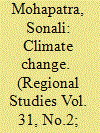

|
|
|
| 3 |
ID:
122269
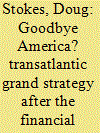

|
|
|
|
|
| Publication |
2013.
|
| Summary/Abstract |
As China rises, the popular wisdom is that the US is in inexorable relative economic decline. A rapid loss of US power would affect the national-security interests of its close allies, particularly the UK. However, Doug Stokes argues that America's decline is not as pronounced as is commonly assumed. Even after the crisis, it remains, fundamentally, economically sound and its strategic power in important parts of the world means it retains the tools to manage a potential 'hegemonic transition'. Nonetheless, the financial crisis has quickened structural shifts in transatlantic relations, which will inevitably have an impact on European strategy.
|
|
|
|
|
|
|
|
|
|
|
|
|
|
|
|
| 4 |
ID:
132439


|
|
|
| 5 |
ID:
120422
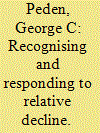

|
|
|
|
|
| Publication |
2013.
|
| Summary/Abstract |
It became increasingly apparent in the 1950s that Britain was in long-term relative economic decline. However, during far-reaching reviews in 1959-1963 of future policy, the Foreign Office and the Treasury could not agree that timely strategic retrenchment would be an appropriate response. Ministers believed that Britain would remain a world Power; the British economy continued to be handicapped by higher levels of defence expenditure than those of other western European Powers; and it took an economic crisis to force a decision to withdraw from east of Suez.
|
|
|
|
|
|
|
|
|
|
|
|
|
|
|
|
| 6 |
ID:
121985


|
|
|
|
|
| Publication |
2013.
|
| Summary/Abstract |
From the end of the fifteenth century, the Ming state redirected the entire flow of the Yellow River into the course of the Huai River in order the facilitate the transport of tribute grain. This shifted the major problems of water control from the middle and lower reaches of the Yellow River to the Huaibei region. Huaibei was viewed as 'a local interest', as opposed to the 'general interests' represented by the central government, and was sacrificed for those general interests. These policies, which were continued under the Qing dynasty, created widespread and frequent flooding in the region, causing short-term famine and destruction and leading to long-term economic decline.
|
|
|
|
|
|
|
|
|
|
|
|
|
|
|
|
| 7 |
ID:
094526
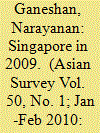

|
|
|
| 8 |
ID:
164965
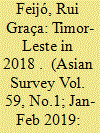

|
|
|
|
|
| Summary/Abstract |
Timor-Leste entered 2018 with a political crisis that kept a minority government without the confidence of parliament. President Lú-Olo tried to resolve the situation by calling early elections, but the incumbency effect did not materialize, and the opposition won the polls. Timor-Leste celebrated an important treaty with Australia on their maritime borders in the Timor Sea.
|
|
|
|
|
|
|
|
|
|
|
|
|
|
|
|